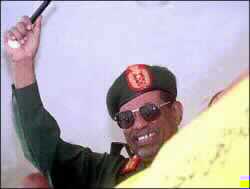HIGHLIGHTS Third Round of Talks in January to Deal with Distribution of Wealth|| Christian and animist south to Decide at the End of a Six Year Interim Period whether to Secede or Stay United with Muslim-dominated North.|| General Elections to be Held during Transitional period, to Give Southern Sudanese Equitable Representation in Civil Service & Both Legislative Chamber|| Sadeq al-Mahdi, Says in Cairo that Power-sharing should be Decided by Ballot Box not "Horse Trading."||STORYThe Sudanese government and the southern rebels have agreed that a post-war government should include representatives from "all political parties", President Omar al-Beshir's peace advisor said.
Ghazi Salah Eddin Atabani told reporters in Khartoum that agreement on this point was reached during the second round of talks with the Sudan People's Liberation Army (SPLA) that ended in Kenya this week.
Besides Beshir's National Congress Party and the SPLA, the post-war cabinet "will include all political parties, northern and southern," Atabani said.
He added that a third round of talks, due to kick off January in Kenya, would "deal extensively with the distribution of wealth", a key issue since both sides must agree how to share Sudan's rich oil reserves.
The negotiators are also set to discuss "security and military arrangements, peace guarantees and preparations" for the six-year period of self-rule that southern Sudan is to enjoy under a groundbreaking preliminary deal signed last summer, Atabani said.
Under the Machakos protocol, the mainly Christian and animist south will decide at the end of the six year interim period whether it will secede or stay united with the Muslim-dominated north.
The talks are aimed at ending Sudan's two decades of civil war, which has claimed an estimated one and a half million lives and displaced some four million people.
BIG ACHIEVEMENT, MUCH TO BE DONE
Talks main achievement so far was that the two sides agreed to extend a cease-fire, signed in October, which had been due to end on December 31. The truce largely appears to be holding, though both sides have accused the other of breaches.
Other points the sides agreed on included holding general elections during the transitional period, to give southern Sudanese equitable representation in the civil service and both legislative chambers, and to hold a census.
But after days of haggling over details, the parties failed to agree on issues like who should hold the posts of president and vice-president, how much autonomy a regional government in southern Sudan should have and how to share oil wealth.
Sudanese opposition leader Sadeq al-Mahdi, a former prime minister and head of the northern-based Umma party, said in Cairo that issue of power-sharing should be decided by the ballot box not "horse trading."
The latest round of talks were intended to build on the momentum from a round that ended in July with a breakthrough agreement on two of the war's most contentious issues -- giving south Sudan the right to secede from the north and separating state and religion in non-Muslim areas.
PHOTO CAPTION
President of Sudan Omar Hassan al-Bashir. An Adviser to the Sudanese President told reporters in Khartoum, Saturday, Nov 23, 2002, that The Sudanese government and the southern rebels have agreed that a post-war government should include representatives from "all political par
- Author:
& News Agencies - Section:
WORLD HEADLINES


 Home
Home Discover Islam
Discover Islam Quran Recitations
Quran Recitations Lectures
Lectures
 Fatwa
Fatwa Articles
Articles Fiqh
Fiqh E-Books
E-Books Boys & Girls
Boys & Girls  Hajj Rulings
Hajj Rulings Hajj Fatwas
Hajj Fatwas














